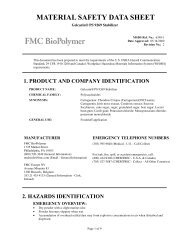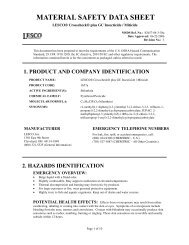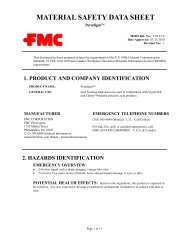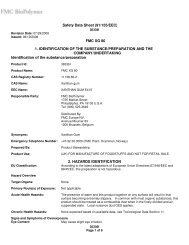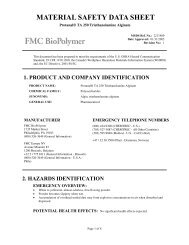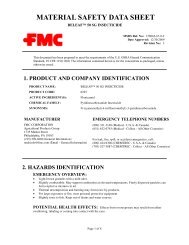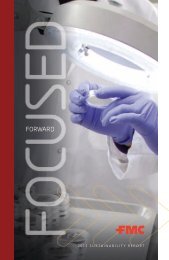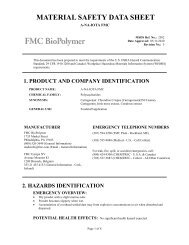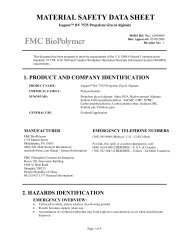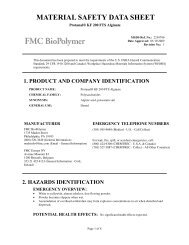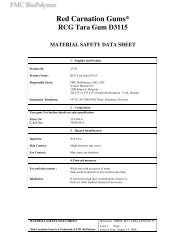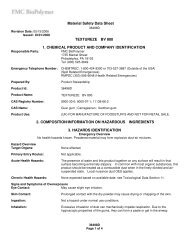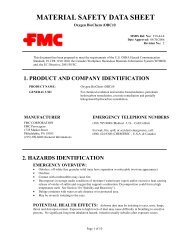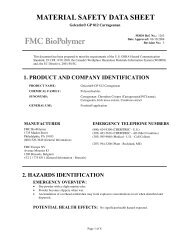Read the Report - FMC Corporation
Read the Report - FMC Corporation
Read the Report - FMC Corporation
You also want an ePaper? Increase the reach of your titles
YUMPU automatically turns print PDFs into web optimized ePapers that Google loves.
We followed <strong>the</strong> Global <strong>Report</strong>ing Initiative<br />
(GRI) G3.1 Sustainability <strong>Report</strong>ing Guidelines<br />
in preparing this report and had it GRI-checked<br />
to an Application Level B. The disclosures and<br />
performance data in this report address <strong>FMC</strong>’s<br />
globally owned and managed facilities and assets<br />
for <strong>the</strong> fiscal year 2012, unless o<strong>the</strong>rwise noted,<br />
and do not address joint ventures or o<strong>the</strong>r<br />
business partnerships. <strong>FMC</strong> will continue to<br />
report our sustainability performance objectives,<br />
goals and progress annually. We welcome your<br />
questions, comments and feedback. For more<br />
information about <strong>FMC</strong> or this report, please<br />
contact Tom Schneberger (sustainability.info@<br />
fmc.com).<br />
Our Materiality Process<br />
In this report, we discuss <strong>the</strong> sustainability<br />
issues we believe to be of most interest to our<br />
stakeholders that are also relevant to <strong>FMC</strong>’s<br />
long-term business objectives. We selected<br />
report content by evaluating <strong>the</strong> potential<br />
impacts and opportunities associated with<br />
current and emerging sustainability issues,<br />
trends and developments and our ability to<br />
influence <strong>the</strong>se issues within <strong>the</strong> context of our<br />
business. We also relied on global voluntary<br />
reporting and industry standards including<br />
<strong>the</strong> GRI G3.1.<br />
To fur<strong>the</strong>r refine <strong>the</strong> process of selecting<br />
content, we consulted GRI’s general list of<br />
issues and CERES 21st century roadmap and<br />
grouped issues into categories typical of <strong>the</strong><br />
sustainability impacts that are germane to<br />
chemical companies, agricultural companies<br />
and mining companies. High priority issues<br />
were determined by using a five-test analysis<br />
that rated each issue based on its significance<br />
to stakeholder groups and cumulative business<br />
impact on <strong>FMC</strong>.<br />
Stakeholder Engagement<br />
<strong>FMC</strong> engages with numerous stakeholders as<br />
a regular business practice. Examples of our<br />
engagement efforts are presented throughout<br />
this report. As part of <strong>the</strong> reporting process,<br />
we received input from customers, distributors,<br />
employees, NGOs, industry associations, suppliers,<br />
business partners, investors, government officials<br />
and <strong>the</strong> general public. This feedback was<br />
aggregated as a part of our materiality assessment<br />
to determine <strong>the</strong> content of this report. Based<br />
on our assessment, we determined <strong>the</strong> following<br />
ABOUT ThIS<br />
REPORT<br />
categories to be material and have addressed<br />
each of <strong>the</strong>se in this report: sustainability<br />
business strategy, safety, innovation in products<br />
and services, green chemistry and products,<br />
serving emerging markets, financial performance,<br />
environmental impacts and resource efficiency,<br />
product safety, talent management, labor<br />
relations and community relations.<br />
Relevant Sustainability Issues<br />
Our materiality test includes five<br />
categories of impact. They are:<br />
Financial Impacts/Risks<br />
Issues posing a potential financial impact<br />
or risk in <strong>the</strong> short, medium or long-term<br />
Legal/Regulatory/Policy Drivers<br />
Issues being shaped by emerging or<br />
evolving government policy and regulation<br />
Peer-Based Norms<br />
Issues our industry peers tend to report on<br />
and recognize as important business drivers<br />
Stakeholder Concerns<br />
and Societal Trends<br />
Issues of high importance to stakeholders,<br />
including communities, NGOs and<br />
<strong>the</strong> general public, and/or issues that<br />
reflect social and consumer trends<br />
Opportunity For Innovation<br />
Areas of potential for innovative solutions<br />
to benefit <strong>the</strong> environment, customers and<br />
o<strong>the</strong>r stakeholders; demonstrate sector<br />
leadership; and create competitive advantage<br />
APPENDIX<br />
<strong>FMC</strong> 2012 SUSTAINABILITY REPORT



